On the back of increasing cases of multi-drug-resistant tuberculosis (MDR-TB), Bedaquiline, the first new drug for Tuberculosis (TB) in over 45 years, is slowly being introduced into Papua New Guinea.
FHI360, through funding from United States Agency for International Development (USAID), is working with the National Department of Health (NDOH) to host a series of training for doctors to introduce this new treatment to TB patients.
Dr Anh Innes, Senior MDR-TB Technical Advisor at USAID Bureau for Global Health, has returned to PNG to oversee USAID’s donation of bedaquiline and provide technical assistance for the NDoH – more specifically the Pharmaceutical Services Standards Branch (PSSB).
According to Dr Innes, their main strategy for the safe introduction of bedaquiline is pharmacovigilance, which is the science of early detection and monitoring of adverse effects.
“When adverse events happen when you take a medicine, you want to be able to find them quickly and manage them effectively.”
USAID and the NDOH PSSB are also using the introduction of bedaquiline as a catalyst to build the foundation for pharmacovigilance for all drugs here in PNG.
In Dr. Innes’ three previous visits, training on pharmacovigilance for bedaquiline was conducted for physicians in 12 provinces.
“Time, we’re focusing on working with the PSSB to roll out the ‘backbone’ for pharmacovigilance through the provincial Medicines and Therapeutics Committee (MTC) – the first stage of the roll out is happening at Gerehu Clinic this week,” said Dr. Innes.
The PSSB will host a series of MTC trainings that will take place in provinces and hospitals throughout the country.
According to FHI360 Country Director Daniel Tesfaye 85 courses of bedaquiline have been donated so far, which have been distributed mainly to Daru hospital and the Port Moresby General Hospital, where high numbers of drug-resistant TB patients are.
“It’s important to ensure that people who have multi-drug resistant tuberculosis (MDR-TB) get the best treatment,” said Mr. Tesfaye.
“…USAID and FHI360 are working with PSSB to ensure that adverse events are actually registered in the global system so that PNG can become a full member of the World Health Organization’s Uppsala Monitoring Center,” he added.
This latest donation follows on from October 2016, when US Ambassador to PNG, Catherine Ebert-Gray donated laboratory and clinical equipment, worth K270,000, to Daru hospital.
Images courtesy of U.S. Embassy


